IT Ethics: Applying Ethical Theories to the Open Internet Question
VerifiedAdded on 2019/10/30
|10
|1685
|148
Essay
AI Summary
This essay delves into the ethical complexities of the open internet, also known as net neutrality, examining the arguments for and against it. It explores the core principle that Internet Service Providers (ISPs) should treat all internet traffic equally, without discrimination or prioritization. The paper analyzes the issue through the lenses of utilitarianism, deontology, virtue theory, and contract theory, assessing how each framework supports or challenges net neutrality. The essay considers arguments from stakeholders like governments, service providers, and end-users, addressing concerns about market infrastructure, potential censorship by larger organizations, and government interference. The author concludes by supporting open internet, arguing that it maximizes benefits for end-users and promotes ethical actions that serve society as a whole, ultimately shaping the future of the internet.
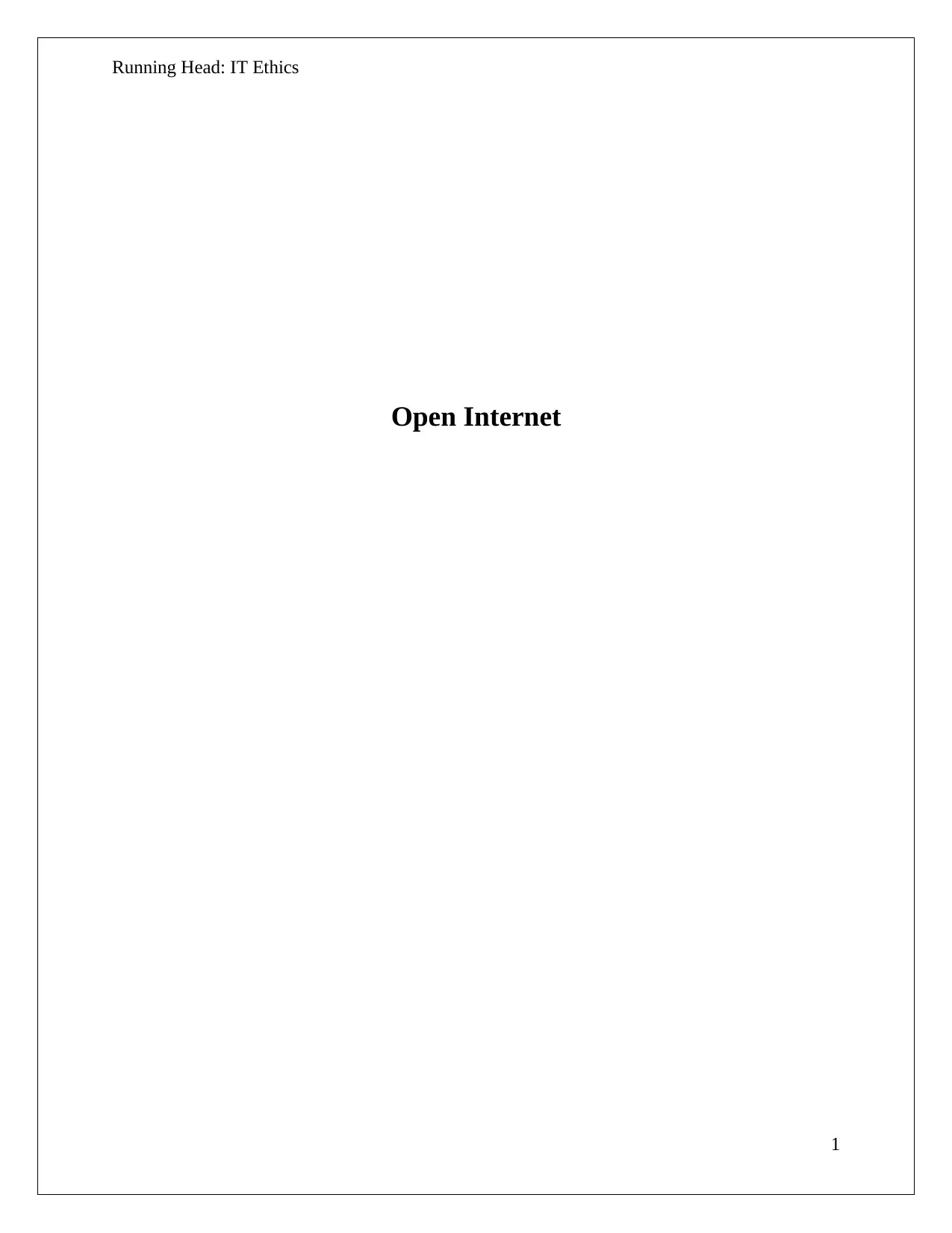
Running Head: IT Ethics
Open Internet
1
Open Internet
1
Paraphrase This Document
Need a fresh take? Get an instant paraphrase of this document with our AI Paraphraser
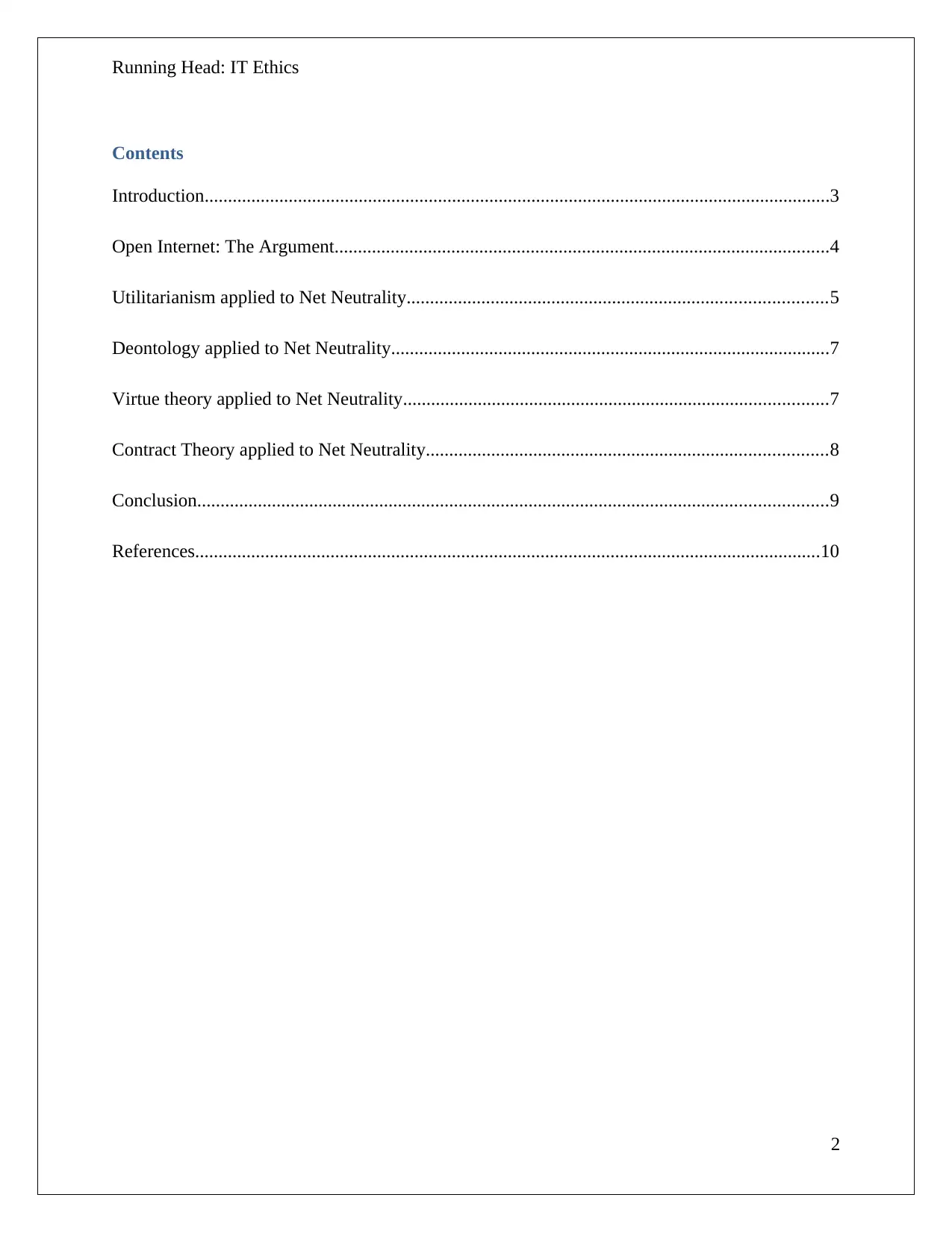
Running Head: IT Ethics
Contents
Introduction......................................................................................................................................3
Open Internet: The Argument..........................................................................................................4
Utilitarianism applied to Net Neutrality..........................................................................................5
Deontology applied to Net Neutrality..............................................................................................7
Virtue theory applied to Net Neutrality...........................................................................................7
Contract Theory applied to Net Neutrality......................................................................................8
Conclusion.......................................................................................................................................9
References......................................................................................................................................10
2
Contents
Introduction......................................................................................................................................3
Open Internet: The Argument..........................................................................................................4
Utilitarianism applied to Net Neutrality..........................................................................................5
Deontology applied to Net Neutrality..............................................................................................7
Virtue theory applied to Net Neutrality...........................................................................................7
Contract Theory applied to Net Neutrality......................................................................................8
Conclusion.......................................................................................................................................9
References......................................................................................................................................10
2
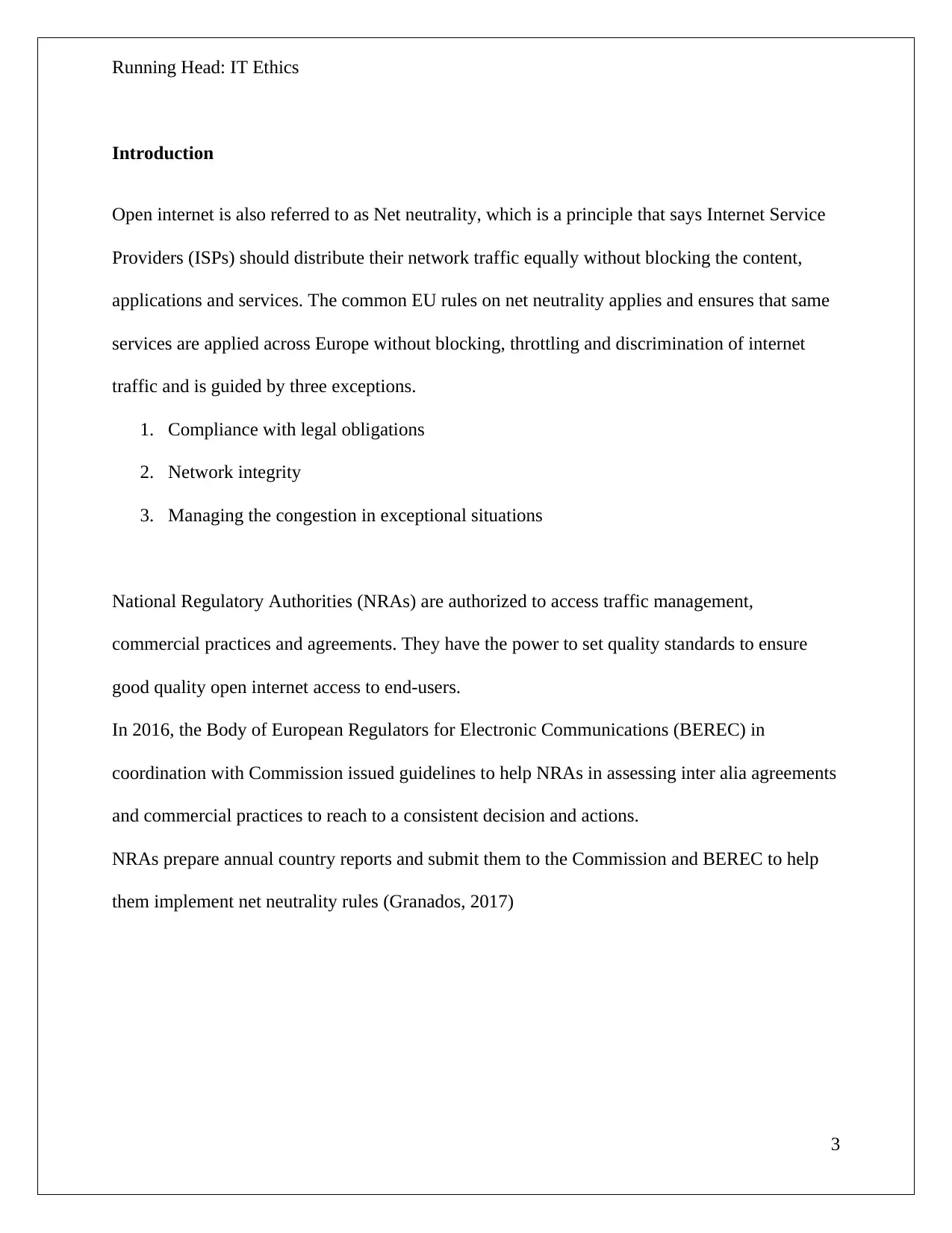
Running Head: IT Ethics
Introduction
Open internet is also referred to as Net neutrality, which is a principle that says Internet Service
Providers (ISPs) should distribute their network traffic equally without blocking the content,
applications and services. The common EU rules on net neutrality applies and ensures that same
services are applied across Europe without blocking, throttling and discrimination of internet
traffic and is guided by three exceptions.
1. Compliance with legal obligations
2. Network integrity
3. Managing the congestion in exceptional situations
National Regulatory Authorities (NRAs) are authorized to access traffic management,
commercial practices and agreements. They have the power to set quality standards to ensure
good quality open internet access to end-users.
In 2016, the Body of European Regulators for Electronic Communications (BEREC) in
coordination with Commission issued guidelines to help NRAs in assessing inter alia agreements
and commercial practices to reach to a consistent decision and actions.
NRAs prepare annual country reports and submit them to the Commission and BEREC to help
them implement net neutrality rules (Granados, 2017)
3
Introduction
Open internet is also referred to as Net neutrality, which is a principle that says Internet Service
Providers (ISPs) should distribute their network traffic equally without blocking the content,
applications and services. The common EU rules on net neutrality applies and ensures that same
services are applied across Europe without blocking, throttling and discrimination of internet
traffic and is guided by three exceptions.
1. Compliance with legal obligations
2. Network integrity
3. Managing the congestion in exceptional situations
National Regulatory Authorities (NRAs) are authorized to access traffic management,
commercial practices and agreements. They have the power to set quality standards to ensure
good quality open internet access to end-users.
In 2016, the Body of European Regulators for Electronic Communications (BEREC) in
coordination with Commission issued guidelines to help NRAs in assessing inter alia agreements
and commercial practices to reach to a consistent decision and actions.
NRAs prepare annual country reports and submit them to the Commission and BEREC to help
them implement net neutrality rules (Granados, 2017)
3
⊘ This is a preview!⊘
Do you want full access?
Subscribe today to unlock all pages.

Trusted by 1+ million students worldwide
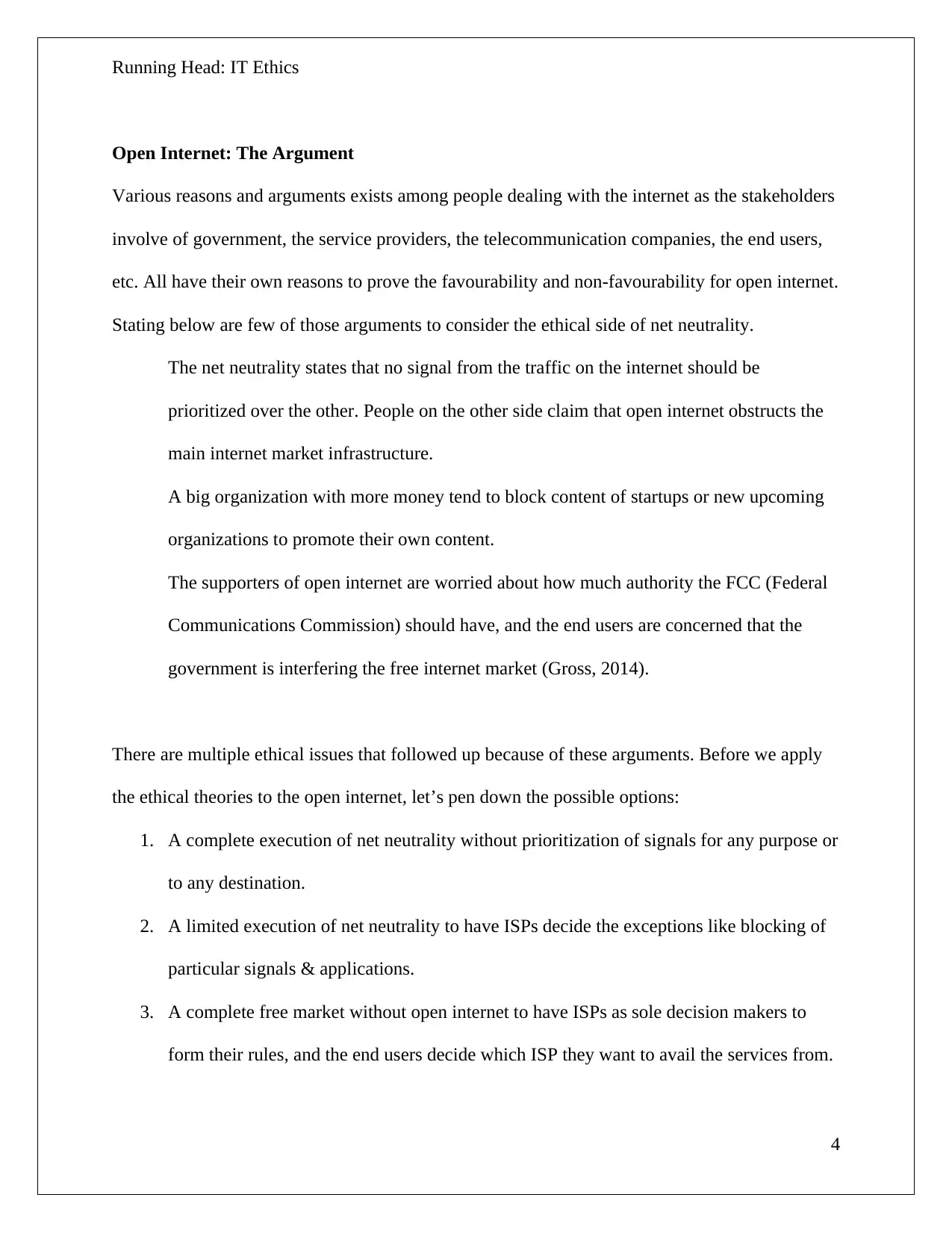
Running Head: IT Ethics
Open Internet: The Argument
Various reasons and arguments exists among people dealing with the internet as the stakeholders
involve of government, the service providers, the telecommunication companies, the end users,
etc. All have their own reasons to prove the favourability and non-favourability for open internet.
Stating below are few of those arguments to consider the ethical side of net neutrality.
The net neutrality states that no signal from the traffic on the internet should be
prioritized over the other. People on the other side claim that open internet obstructs the
main internet market infrastructure.
A big organization with more money tend to block content of startups or new upcoming
organizations to promote their own content.
The supporters of open internet are worried about how much authority the FCC (Federal
Communications Commission) should have, and the end users are concerned that the
government is interfering the free internet market (Gross, 2014).
There are multiple ethical issues that followed up because of these arguments. Before we apply
the ethical theories to the open internet, let’s pen down the possible options:
1. A complete execution of net neutrality without prioritization of signals for any purpose or
to any destination.
2. A limited execution of net neutrality to have ISPs decide the exceptions like blocking of
particular signals & applications.
3. A complete free market without open internet to have ISPs as sole decision makers to
form their rules, and the end users decide which ISP they want to avail the services from.
4
Open Internet: The Argument
Various reasons and arguments exists among people dealing with the internet as the stakeholders
involve of government, the service providers, the telecommunication companies, the end users,
etc. All have their own reasons to prove the favourability and non-favourability for open internet.
Stating below are few of those arguments to consider the ethical side of net neutrality.
The net neutrality states that no signal from the traffic on the internet should be
prioritized over the other. People on the other side claim that open internet obstructs the
main internet market infrastructure.
A big organization with more money tend to block content of startups or new upcoming
organizations to promote their own content.
The supporters of open internet are worried about how much authority the FCC (Federal
Communications Commission) should have, and the end users are concerned that the
government is interfering the free internet market (Gross, 2014).
There are multiple ethical issues that followed up because of these arguments. Before we apply
the ethical theories to the open internet, let’s pen down the possible options:
1. A complete execution of net neutrality without prioritization of signals for any purpose or
to any destination.
2. A limited execution of net neutrality to have ISPs decide the exceptions like blocking of
particular signals & applications.
3. A complete free market without open internet to have ISPs as sole decision makers to
form their rules, and the end users decide which ISP they want to avail the services from.
4
Paraphrase This Document
Need a fresh take? Get an instant paraphrase of this document with our AI Paraphraser
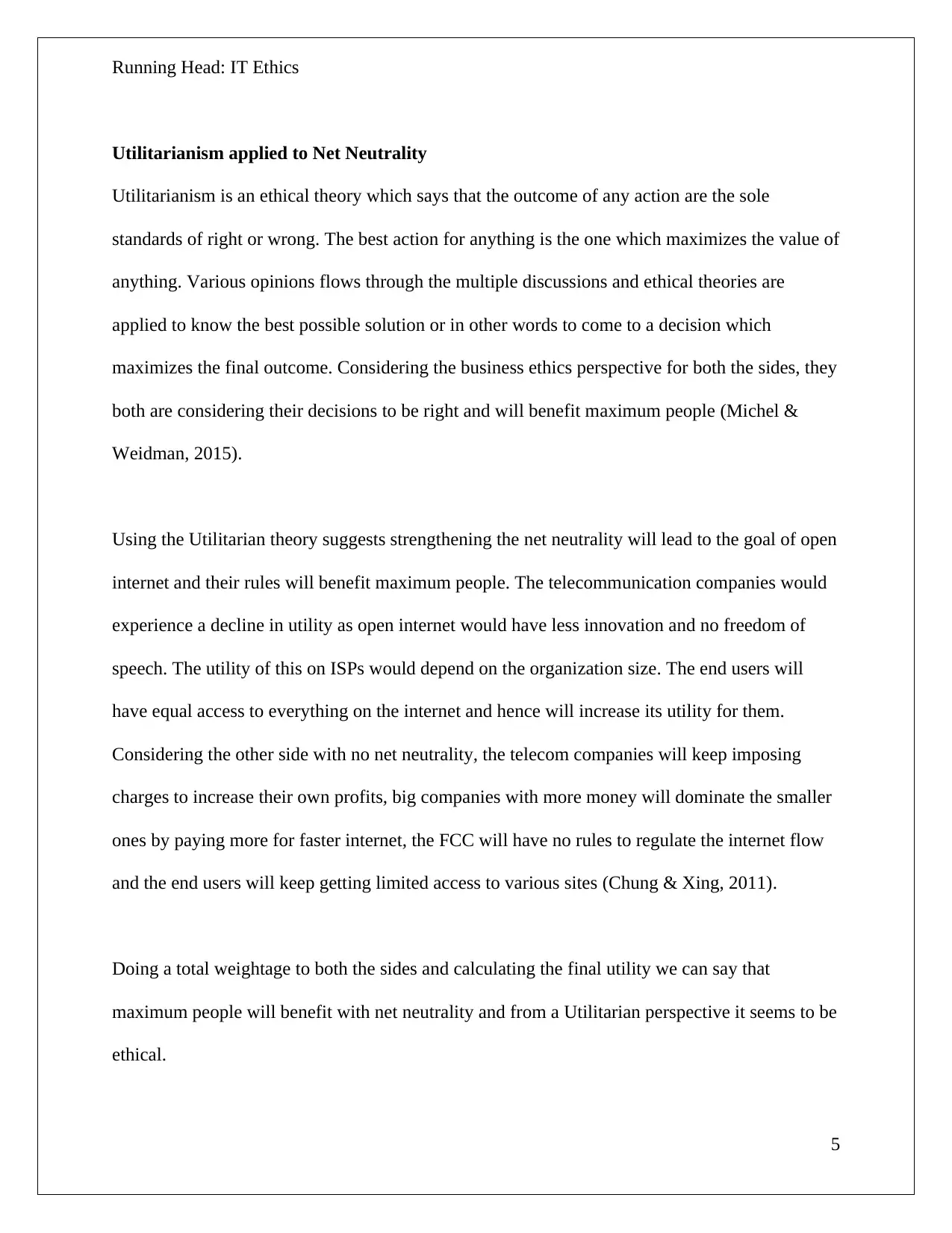
Running Head: IT Ethics
Utilitarianism applied to Net Neutrality
Utilitarianism is an ethical theory which says that the outcome of any action are the sole
standards of right or wrong. The best action for anything is the one which maximizes the value of
anything. Various opinions flows through the multiple discussions and ethical theories are
applied to know the best possible solution or in other words to come to a decision which
maximizes the final outcome. Considering the business ethics perspective for both the sides, they
both are considering their decisions to be right and will benefit maximum people (Michel &
Weidman, 2015).
Using the Utilitarian theory suggests strengthening the net neutrality will lead to the goal of open
internet and their rules will benefit maximum people. The telecommunication companies would
experience a decline in utility as open internet would have less innovation and no freedom of
speech. The utility of this on ISPs would depend on the organization size. The end users will
have equal access to everything on the internet and hence will increase its utility for them.
Considering the other side with no net neutrality, the telecom companies will keep imposing
charges to increase their own profits, big companies with more money will dominate the smaller
ones by paying more for faster internet, the FCC will have no rules to regulate the internet flow
and the end users will keep getting limited access to various sites (Chung & Xing, 2011).
Doing a total weightage to both the sides and calculating the final utility we can say that
maximum people will benefit with net neutrality and from a Utilitarian perspective it seems to be
ethical.
5
Utilitarianism applied to Net Neutrality
Utilitarianism is an ethical theory which says that the outcome of any action are the sole
standards of right or wrong. The best action for anything is the one which maximizes the value of
anything. Various opinions flows through the multiple discussions and ethical theories are
applied to know the best possible solution or in other words to come to a decision which
maximizes the final outcome. Considering the business ethics perspective for both the sides, they
both are considering their decisions to be right and will benefit maximum people (Michel &
Weidman, 2015).
Using the Utilitarian theory suggests strengthening the net neutrality will lead to the goal of open
internet and their rules will benefit maximum people. The telecommunication companies would
experience a decline in utility as open internet would have less innovation and no freedom of
speech. The utility of this on ISPs would depend on the organization size. The end users will
have equal access to everything on the internet and hence will increase its utility for them.
Considering the other side with no net neutrality, the telecom companies will keep imposing
charges to increase their own profits, big companies with more money will dominate the smaller
ones by paying more for faster internet, the FCC will have no rules to regulate the internet flow
and the end users will keep getting limited access to various sites (Chung & Xing, 2011).
Doing a total weightage to both the sides and calculating the final utility we can say that
maximum people will benefit with net neutrality and from a Utilitarian perspective it seems to be
ethical.
5
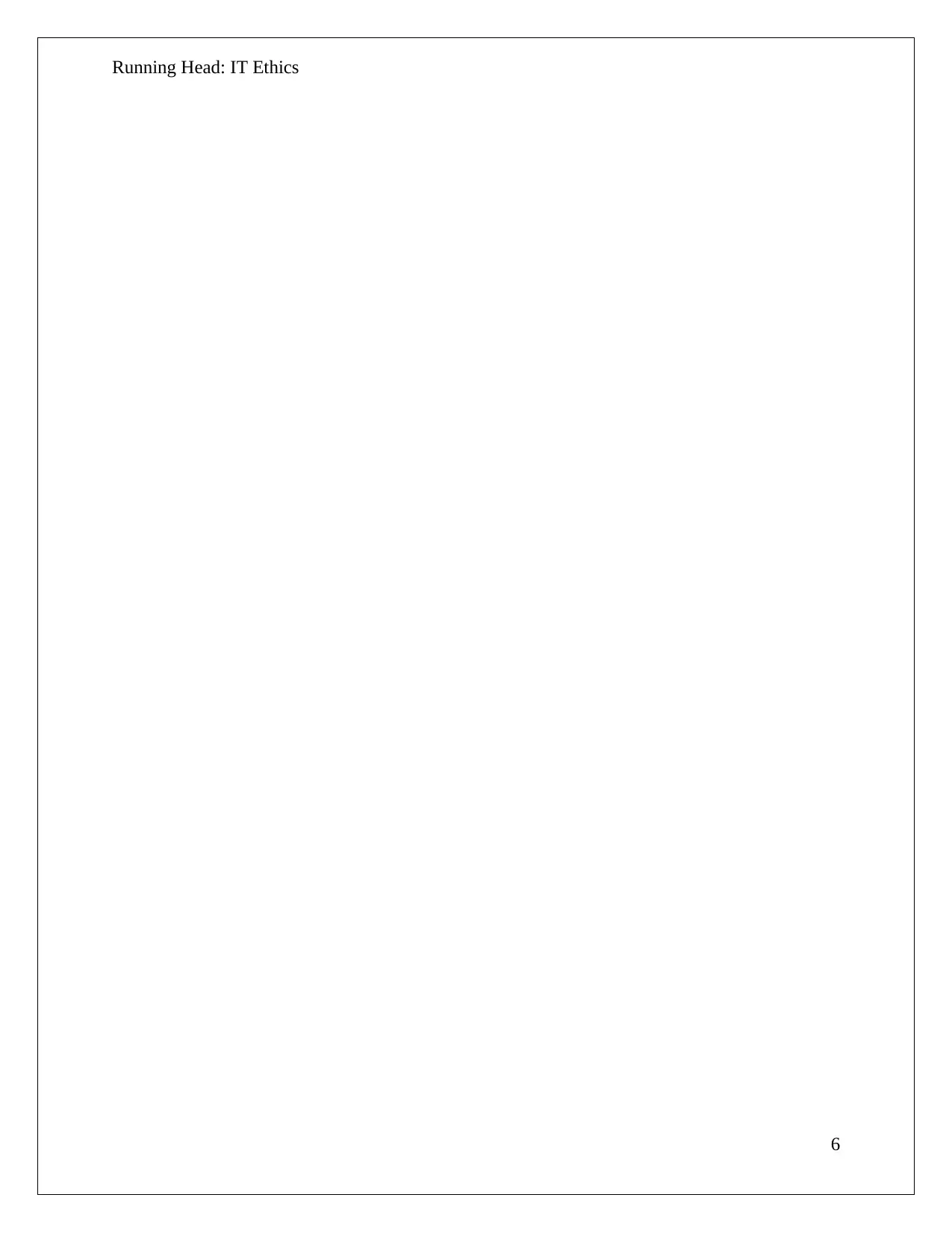
Running Head: IT Ethics
6
6
⊘ This is a preview!⊘
Do you want full access?
Subscribe today to unlock all pages.

Trusted by 1+ million students worldwide
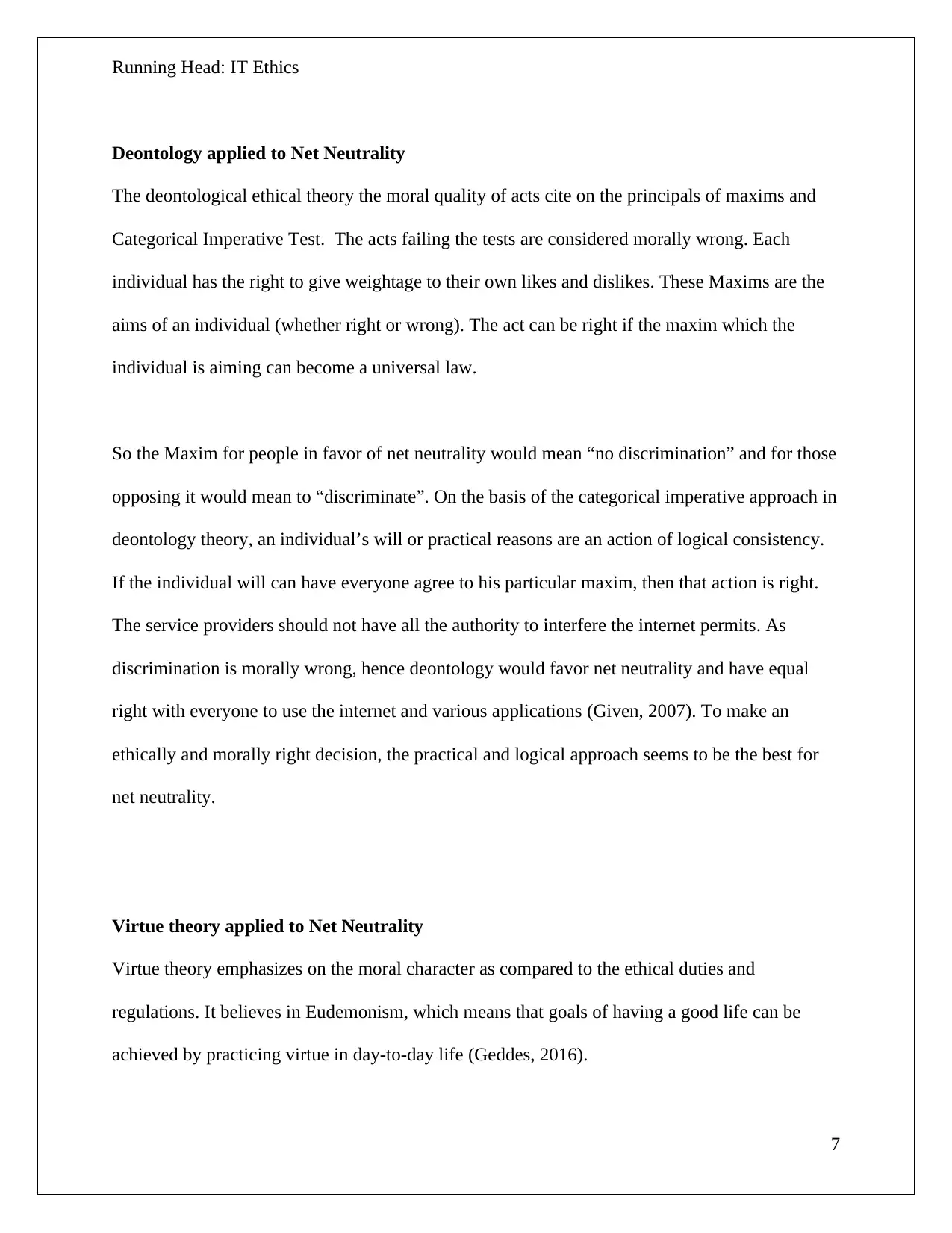
Running Head: IT Ethics
Deontology applied to Net Neutrality
The deontological ethical theory the moral quality of acts cite on the principals of maxims and
Categorical Imperative Test. The acts failing the tests are considered morally wrong. Each
individual has the right to give weightage to their own likes and dislikes. These Maxims are the
aims of an individual (whether right or wrong). The act can be right if the maxim which the
individual is aiming can become a universal law.
So the Maxim for people in favor of net neutrality would mean “no discrimination” and for those
opposing it would mean to “discriminate”. On the basis of the categorical imperative approach in
deontology theory, an individual’s will or practical reasons are an action of logical consistency.
If the individual will can have everyone agree to his particular maxim, then that action is right.
The service providers should not have all the authority to interfere the internet permits. As
discrimination is morally wrong, hence deontology would favor net neutrality and have equal
right with everyone to use the internet and various applications (Given, 2007). To make an
ethically and morally right decision, the practical and logical approach seems to be the best for
net neutrality.
Virtue theory applied to Net Neutrality
Virtue theory emphasizes on the moral character as compared to the ethical duties and
regulations. It believes in Eudemonism, which means that goals of having a good life can be
achieved by practicing virtue in day-to-day life (Geddes, 2016).
7
Deontology applied to Net Neutrality
The deontological ethical theory the moral quality of acts cite on the principals of maxims and
Categorical Imperative Test. The acts failing the tests are considered morally wrong. Each
individual has the right to give weightage to their own likes and dislikes. These Maxims are the
aims of an individual (whether right or wrong). The act can be right if the maxim which the
individual is aiming can become a universal law.
So the Maxim for people in favor of net neutrality would mean “no discrimination” and for those
opposing it would mean to “discriminate”. On the basis of the categorical imperative approach in
deontology theory, an individual’s will or practical reasons are an action of logical consistency.
If the individual will can have everyone agree to his particular maxim, then that action is right.
The service providers should not have all the authority to interfere the internet permits. As
discrimination is morally wrong, hence deontology would favor net neutrality and have equal
right with everyone to use the internet and various applications (Given, 2007). To make an
ethically and morally right decision, the practical and logical approach seems to be the best for
net neutrality.
Virtue theory applied to Net Neutrality
Virtue theory emphasizes on the moral character as compared to the ethical duties and
regulations. It believes in Eudemonism, which means that goals of having a good life can be
achieved by practicing virtue in day-to-day life (Geddes, 2016).
7
Paraphrase This Document
Need a fresh take? Get an instant paraphrase of this document with our AI Paraphraser
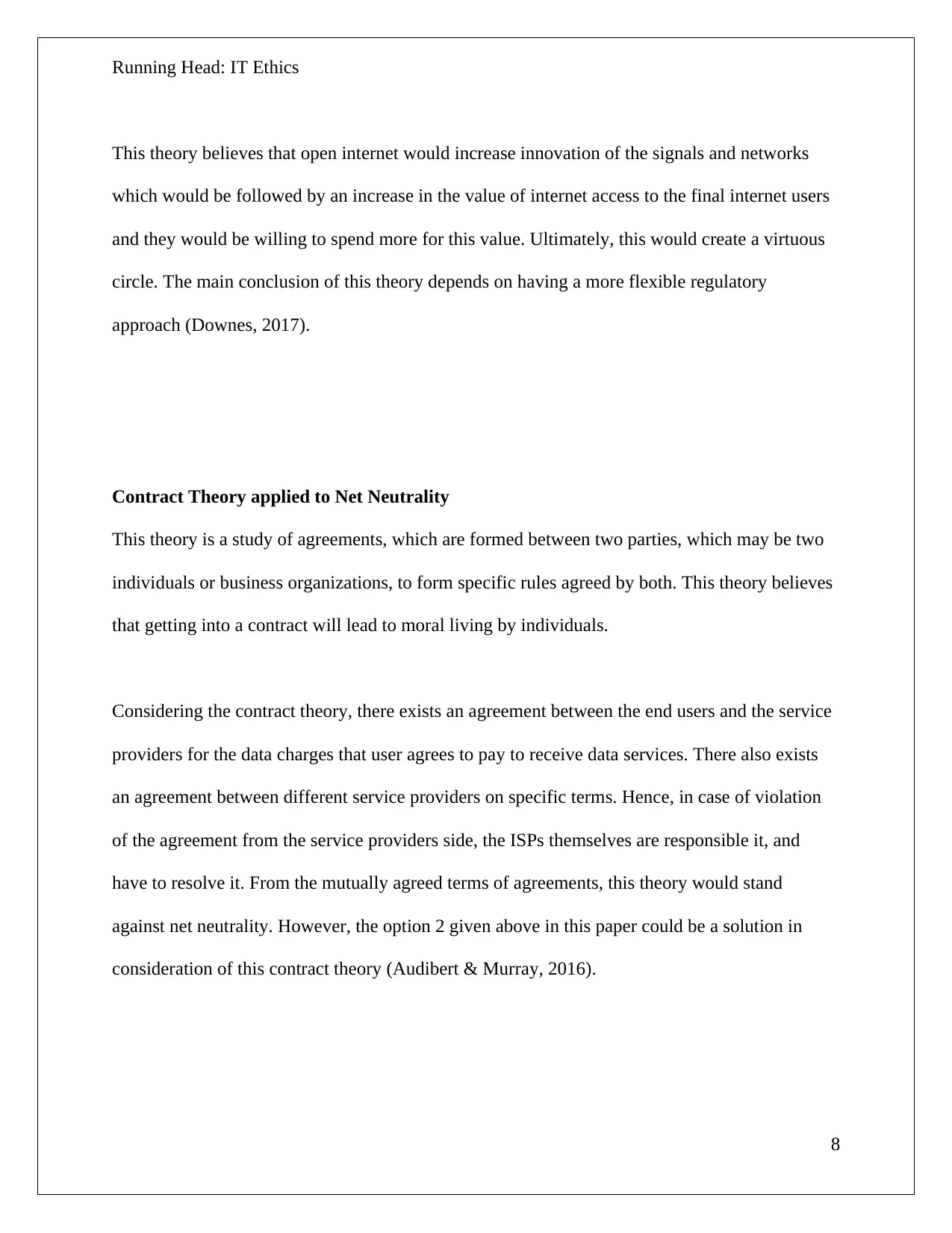
Running Head: IT Ethics
This theory believes that open internet would increase innovation of the signals and networks
which would be followed by an increase in the value of internet access to the final internet users
and they would be willing to spend more for this value. Ultimately, this would create a virtuous
circle. The main conclusion of this theory depends on having a more flexible regulatory
approach (Downes, 2017).
Contract Theory applied to Net Neutrality
This theory is a study of agreements, which are formed between two parties, which may be two
individuals or business organizations, to form specific rules agreed by both. This theory believes
that getting into a contract will lead to moral living by individuals.
Considering the contract theory, there exists an agreement between the end users and the service
providers for the data charges that user agrees to pay to receive data services. There also exists
an agreement between different service providers on specific terms. Hence, in case of violation
of the agreement from the service providers side, the ISPs themselves are responsible it, and
have to resolve it. From the mutually agreed terms of agreements, this theory would stand
against net neutrality. However, the option 2 given above in this paper could be a solution in
consideration of this contract theory (Audibert & Murray, 2016).
8
This theory believes that open internet would increase innovation of the signals and networks
which would be followed by an increase in the value of internet access to the final internet users
and they would be willing to spend more for this value. Ultimately, this would create a virtuous
circle. The main conclusion of this theory depends on having a more flexible regulatory
approach (Downes, 2017).
Contract Theory applied to Net Neutrality
This theory is a study of agreements, which are formed between two parties, which may be two
individuals or business organizations, to form specific rules agreed by both. This theory believes
that getting into a contract will lead to moral living by individuals.
Considering the contract theory, there exists an agreement between the end users and the service
providers for the data charges that user agrees to pay to receive data services. There also exists
an agreement between different service providers on specific terms. Hence, in case of violation
of the agreement from the service providers side, the ISPs themselves are responsible it, and
have to resolve it. From the mutually agreed terms of agreements, this theory would stand
against net neutrality. However, the option 2 given above in this paper could be a solution in
consideration of this contract theory (Audibert & Murray, 2016).
8
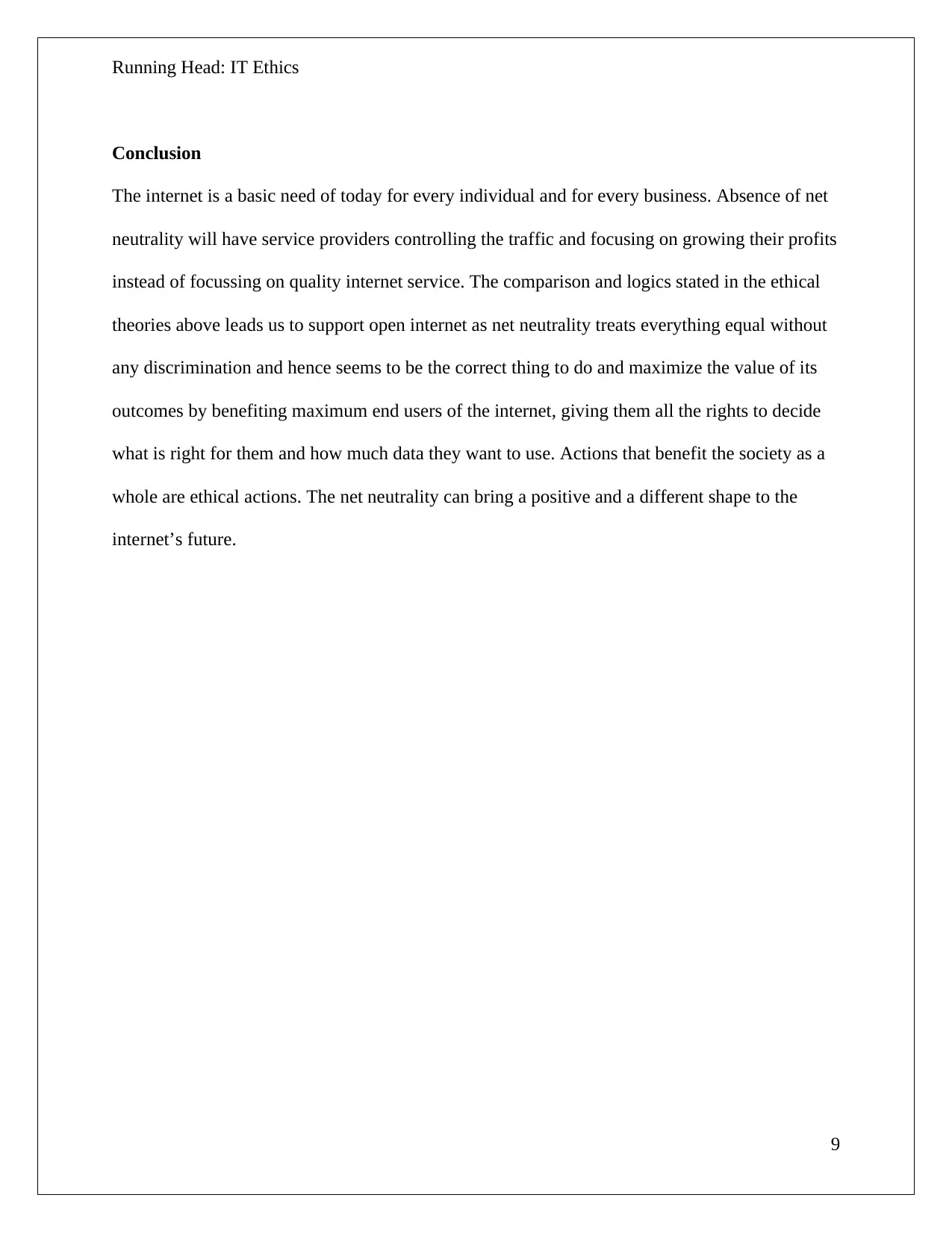
Running Head: IT Ethics
Conclusion
The internet is a basic need of today for every individual and for every business. Absence of net
neutrality will have service providers controlling the traffic and focusing on growing their profits
instead of focussing on quality internet service. The comparison and logics stated in the ethical
theories above leads us to support open internet as net neutrality treats everything equal without
any discrimination and hence seems to be the correct thing to do and maximize the value of its
outcomes by benefiting maximum end users of the internet, giving them all the rights to decide
what is right for them and how much data they want to use. Actions that benefit the society as a
whole are ethical actions. The net neutrality can bring a positive and a different shape to the
internet’s future.
9
Conclusion
The internet is a basic need of today for every individual and for every business. Absence of net
neutrality will have service providers controlling the traffic and focusing on growing their profits
instead of focussing on quality internet service. The comparison and logics stated in the ethical
theories above leads us to support open internet as net neutrality treats everything equal without
any discrimination and hence seems to be the correct thing to do and maximize the value of its
outcomes by benefiting maximum end users of the internet, giving them all the rights to decide
what is right for them and how much data they want to use. Actions that benefit the society as a
whole are ethical actions. The net neutrality can bring a positive and a different shape to the
internet’s future.
9
⊘ This is a preview!⊘
Do you want full access?
Subscribe today to unlock all pages.

Trusted by 1+ million students worldwide
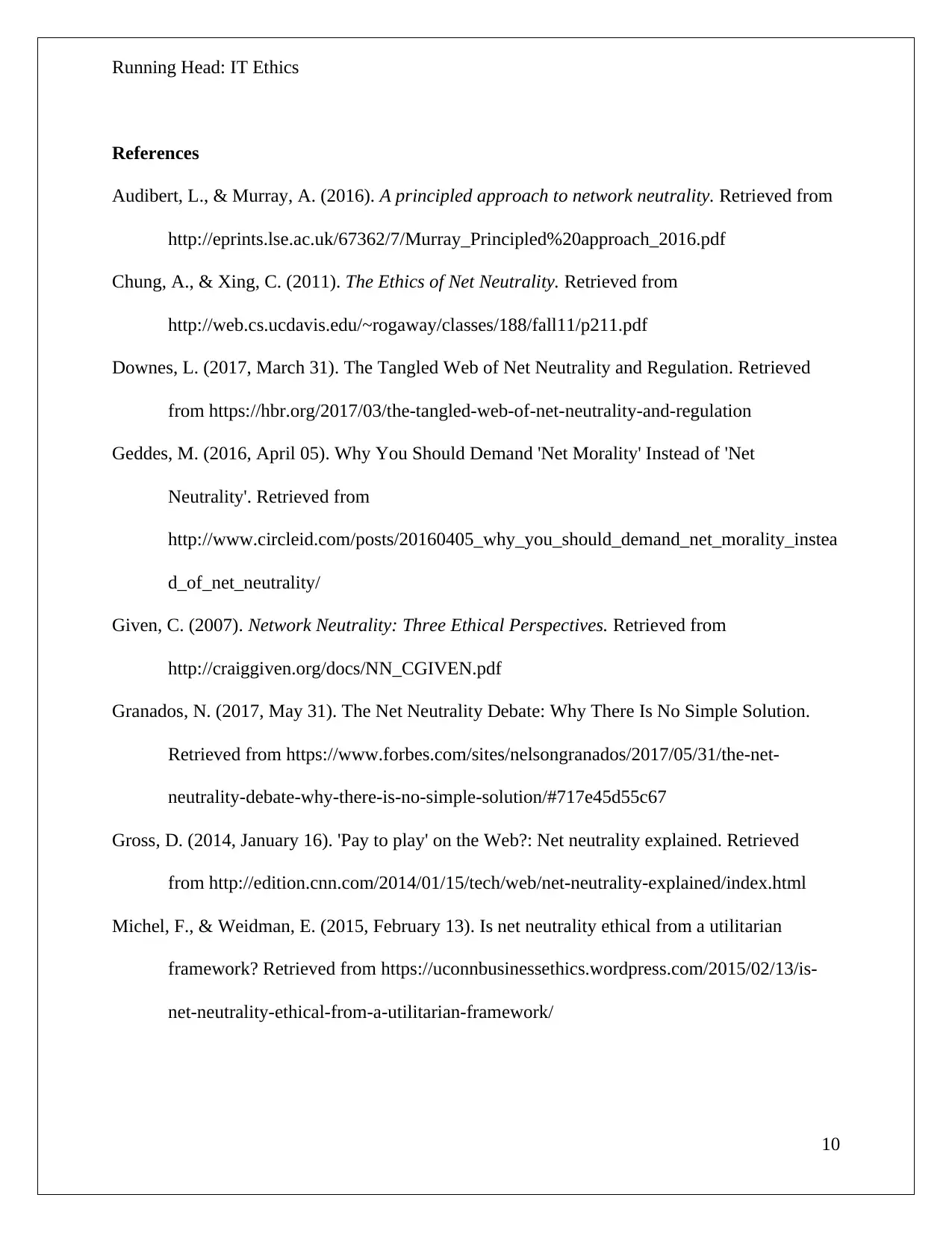
Running Head: IT Ethics
References
Audibert, L., & Murray, A. (2016). A principled approach to network neutrality. Retrieved from
http://eprints.lse.ac.uk/67362/7/Murray_Principled%20approach_2016.pdf
Chung, A., & Xing, C. (2011). The Ethics of Net Neutrality. Retrieved from
http://web.cs.ucdavis.edu/~rogaway/classes/188/fall11/p211.pdf
Downes, L. (2017, March 31). The Tangled Web of Net Neutrality and Regulation. Retrieved
from https://hbr.org/2017/03/the-tangled-web-of-net-neutrality-and-regulation
Geddes, M. (2016, April 05). Why You Should Demand 'Net Morality' Instead of 'Net
Neutrality'. Retrieved from
http://www.circleid.com/posts/20160405_why_you_should_demand_net_morality_instea
d_of_net_neutrality/
Given, C. (2007). Network Neutrality: Three Ethical Perspectives. Retrieved from
http://craiggiven.org/docs/NN_CGIVEN.pdf
Granados, N. (2017, May 31). The Net Neutrality Debate: Why There Is No Simple Solution.
Retrieved from https://www.forbes.com/sites/nelsongranados/2017/05/31/the-net-
neutrality-debate-why-there-is-no-simple-solution/#717e45d55c67
Gross, D. (2014, January 16). 'Pay to play' on the Web?: Net neutrality explained. Retrieved
from http://edition.cnn.com/2014/01/15/tech/web/net-neutrality-explained/index.html
Michel, F., & Weidman, E. (2015, February 13). Is net neutrality ethical from a utilitarian
framework? Retrieved from https://uconnbusinessethics.wordpress.com/2015/02/13/is-
net-neutrality-ethical-from-a-utilitarian-framework/
10
References
Audibert, L., & Murray, A. (2016). A principled approach to network neutrality. Retrieved from
http://eprints.lse.ac.uk/67362/7/Murray_Principled%20approach_2016.pdf
Chung, A., & Xing, C. (2011). The Ethics of Net Neutrality. Retrieved from
http://web.cs.ucdavis.edu/~rogaway/classes/188/fall11/p211.pdf
Downes, L. (2017, March 31). The Tangled Web of Net Neutrality and Regulation. Retrieved
from https://hbr.org/2017/03/the-tangled-web-of-net-neutrality-and-regulation
Geddes, M. (2016, April 05). Why You Should Demand 'Net Morality' Instead of 'Net
Neutrality'. Retrieved from
http://www.circleid.com/posts/20160405_why_you_should_demand_net_morality_instea
d_of_net_neutrality/
Given, C. (2007). Network Neutrality: Three Ethical Perspectives. Retrieved from
http://craiggiven.org/docs/NN_CGIVEN.pdf
Granados, N. (2017, May 31). The Net Neutrality Debate: Why There Is No Simple Solution.
Retrieved from https://www.forbes.com/sites/nelsongranados/2017/05/31/the-net-
neutrality-debate-why-there-is-no-simple-solution/#717e45d55c67
Gross, D. (2014, January 16). 'Pay to play' on the Web?: Net neutrality explained. Retrieved
from http://edition.cnn.com/2014/01/15/tech/web/net-neutrality-explained/index.html
Michel, F., & Weidman, E. (2015, February 13). Is net neutrality ethical from a utilitarian
framework? Retrieved from https://uconnbusinessethics.wordpress.com/2015/02/13/is-
net-neutrality-ethical-from-a-utilitarian-framework/
10
1 out of 10
Related Documents
Your All-in-One AI-Powered Toolkit for Academic Success.
+13062052269
info@desklib.com
Available 24*7 on WhatsApp / Email
![[object Object]](/_next/static/media/star-bottom.7253800d.svg)
Unlock your academic potential
Copyright © 2020–2026 A2Z Services. All Rights Reserved. Developed and managed by ZUCOL.





